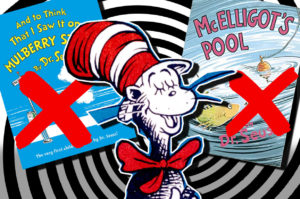It would appear as if nothing is beyond reproach these days…. regardless of longevity or cultural entrenchment.
Not only have we seen Chris Harrison, after 25 seasons as host of ABC television’s ‘The Bachelor’, cast aside for not condemning antebellum parties and six Dr. Seuss books taken out of circulation for ‘offensive content’; but we also witnessed the removal of Andrew Jackson’s statue from its namesake city of Jackson, Mississippi, due to the seventh president’s ownership of slaves; the Washington Redskins renamed the Washington Football Team after much protest from Native American/Indigenous groups; and, most recently, the relocation of the Major League Baseball (MLB) game from Atlanta, Georgia, to Denver, Colorado, on account of the state’s lack of support for voter rights.
All prime examples of ‘Cancel Culture’ that have created a ripple-like effect seen and felt throughout virtually every sector of our society.
In an effort to amend the sins of our forefathers and, thereby offer a bridge or olive branch to those who may have felt ostracized and/or marginalized, or as Dr. Seuss’ publishers characterized, “portrayed people in ways that were hurtful and wrong,”
It has been deemed necessary – for the purpose of teaching life lessons – to eradicate the allegedly harmful reminders.

Yet, going forward in order to learn from the mistakes of our predecessors, is it not our duty that we retain, despite accompanying negative connotations, some vestiges of the past?
To better answer this vexing and often polarizing question, we will first need to get a better understanding of the idea that is presently permeating our culture that of… ‘Cancel Culture.’
The targets of disparaging commentaries and behaviors can extend far beyond racial groups to include any speech/commentary construed as attacking or denouncing a particular demographic or ethnic group, gender class, sexual orientation, et al, subsets of the population that have been made to feel disrespected and their rights/liberties not protected.
Yet, as cancel culture continues to boulder across America knocking down long-established visual images and montages of persons formerly revered and looked upon as meritorious contributors, we may want to pause and ponder whether scrubbing our nation’s history is the best way to heal our fractured society?
However, before we discuss the debates being waged on both sides of the ‘Cancel Culture controversy,’ we will first attempt to define the term and explain its current-day usage.
According to Urban Dictionary, ‘Cancel Culture’ is defined as the act of “dismissing something or somebody” or “rejecting an individual or idea.” Many current examples of cancel culture stem from what may be characterized as a high-profile person’s either and/or lack of condemnation or appearance of approval (go along, get along syndrome) with a past occurrence that, in today’s times, is viewed to be hurtful and/or discriminating to a particular group or issue.
Cases in point, in separate forums, Chris Harrison (‘The Bachelor” franchise, ABC-TV) and Megyn Kelly (news anchor, NBC-TV) publicly came across as unwilling to disavow such racist practices as respectively, Southern Antebellum parties (held at former plantations worked by slaves) and Black face costumes. When questioned, both Harrison and Kelly seemed to share the sentiment that things done in past were at one point in time considered acceptable or, at minimum, were not scrutinized to the degree they are now in our more evolved, ‘woke’ world.

However, when their comments came under the microscope, both Harrison and Kelly were besieged with demands for their ousting due to what many referred to the perpetuation of racist behaviors.
Though Harrison’s departure may turn out to be only temporary, both his and Kelly’s affiliated networks acted immediately to distance themselves and removing them from the airwaves despite having to incur, as was true in Kelly’s situation, exorbitant costs in the neighborhood of $30 million dollars, to pay out the remainder of her NBC contract.
No longer willing to tolerate inaction, members of the public, advocates of what has been called ‘accountability culture,’ expect governing bodies to take swift and decisive action and condemn behavior that is even remotely discriminatory. Regardless of any associated costs, the point is to send a strong message for, in today’s times, public perception trumps the bottom line.
Should the majority of the viewers be distraught with or distrustful of an on-air personality, then the onus falls upon the network to not hesitate in taking suitable action, otherwise they run the risk of losing more than just money; they put their stations’ credibility and viewer loyalty at stake.
While these are just two examples of ‘Cancel Culture’ increasingly we are seeing more and more instances, whereby akin to a white board, any and all traces inferences of hatred or shows of superiority to prescribed demographic groups are being ‘powered washed’ to reveal a clean slate.
We have seen this banishment occur with beloved figures from national morning shows to late night comedy stand-ups; from film production companies to theatrical & musical stages. While the specifics of some of the most high-profile departures have varied, their root causes share common underlying tenets of: racial slurs, gender biases, ‘Me, Too Movement’-related cases, homophobic slanders and/or disparaging comments of certain ethnographic origins; all of these (whether uttered on air/camera or contained as part of their own personal social media propaganda-pages-arsenal) and more have been used to impugn a person.
And, with the world now watching it is often not considered punishment enough to simply fine or remove someone for a day or two, but to permanently oust them without the possibility of return.
Although the removal of a television show host or scheduled musical entertainer may not be viewed as erasing a vital piece of history, the decision to dismantle a statue or rename a city or a sports franchise may involve a different set of metrics. A critic of ‘Cancel Culture’, the Urban Dictionary, in their admonishment of the practice, states that because it does not give individuals an opportunity to learn from or apologize for their wrongdoings, it makes no room for redemption.
Apparently, our world is becoming less tolerant of inaction and, thus, more willing to embrace change in the way of new faces on our favorite shows and replacement monuments and homages being paid to persons deemed worthy of the honor. Though
the trade-off often occurs at the cost of the disgraced figure, the public perceives this as a necessary casualty if we truly want to eradicate our society of the vitriol and hate in which we have been shrouded in for so very long.

The good news is we can and are evolving as a society. Yet, the concern of many is at what cost? While we may chose to no longer idolize persons we deem unworthy of such an honor, for educational purposes, we may want to retain some vestiges of their identity and ill-pursuits. For without remembrances of the past, no matter how painful or dehumanizing they may be, are we to learn and move on from our previous mistakes.
As philosopher and Harvard Professor George Santayana stated, “Those who cannot remember the past are condemned to repeat it.”
As the carnage of the ‘Cancel Culture’ movement continues to pile up, perhaps the question to ask is: Where and when is it appropriate to keep remnants and educate persons of negative past mistakes?
As things currently stand, the majority of people seem to be in favor of removing any and reminders from public sight. Yet, if we are not careful, that quick-twitch type of response may just be an easy way to sweep everything under the rug. Yet, despite being out of sight, harmful traces linger and continue to permeate the air.


